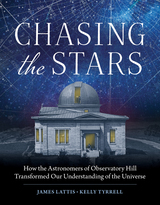9 start with O start with O
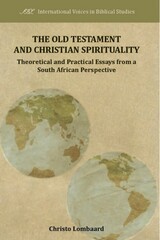
An engaging anthology that deals with both theory and practice
The emerging discipline of biblical spirituality considers how faith finds expression within the biblical texts and how modern expressions of faith interact with those texts. This volume represents Christo Lombaard’s reflective, analytical, and exegetical contributions to the field in order to explore how biblical texts mediate faith, both ancient and contemporary. It reflects on aspects of the interaction of faith and Scripture, critically approaching both dimensions.
Features:
- Seven previously published papers drawn predominately from South African journals
- Explorations of how biblical texts mediate faith
- Close examination of the discipline of biblical spirituality as part of spirituality studies

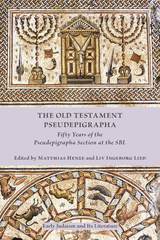
A history of research that changed scholarly perceptions of early Judaism
This collection of essays by some of the most important scholars in the fields of early Judaism and Christianity celebrates fifty years of the study of the Old Testament Pseudepigrapha at the Society of Biblical Literature and the pioneering scholars who introduced the Pseudepigrapha to the Society. Since its early days as a breakfast meeting in 1969, the Pseudepigrapha Section has provided a forum for a rigorous discussion of these understudied texts and their relevance for Judaism and Christianity. Contributors recount the history of the section's beginnings, critically examine the vivid debates that shaped the discipline, and challenge future generations to expand the field in new interdisciplinary directions.
Features:
- Reflections from early members of the Pseudepigrapha Group
- Essays that examine a methodological shift from capturing and preserving traditions to exploring the intellectual and social world of Jewish antiquity
- Evaluations of past interactions with adjacent fields and the larger academic world
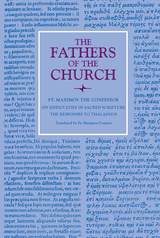
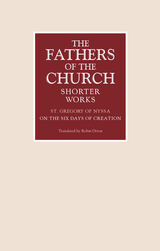
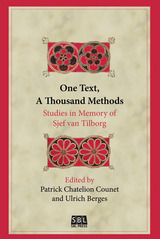
A Brill classic now in paperback from SBL Press
Essays in this volume describe the shift in biblical exegesis within the last several decades from the interpretation of biblical texts as the outcome of historical development, or diachronic methodology, to the exploration of the text as the result of a reading process rather than a historical process, or synchronic methodology. The methods discussed include ideology criticism, semantic and poetic analysis, cognitive linguistics, drama theory, narratology, deconstruction, and anthropology, and intertextuality. The authors of this work challenge biblical scholars not to just perform exegesis, but to explore the methods and aims underlying their interpretations.
Features:
- Essays examine texts from the Old or New Testament through the lens of one of the many modern synchronic methods used in postmodern literary interpretation
- Fifteen essays from top scholars in the field
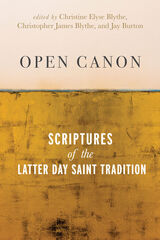
Chapters cover both well-studied and lesser-studied works, introducing readers to scripture dictated by nineteenth- and twentieth-century revelators such as James Strang, Lucy Mack Smith, Sidney Rigdon, Harry Edgar Baker, and Charles B. Thompson, among others. Contributors detail how various Latter Day Saint denominations responded to scriptures introduced during the ministry of Joseph Smith and how churches have employed the Book of Mormon, the Doctrine and Covenants, and the Lectures of Faith over time. Bringing together studies from across denominational boundaries, this book considers what we can learn about Latter Day Saint resistance to the closed canon and the nature of a new American scriptural tradition.
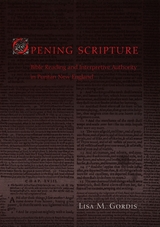
What role did the Bible really play in Puritan New England? Many have treated it as a blunt instrument used to cudgel dissenters into submission, but Lisa M. Gordis reveals instead that Puritan readings of the Bible showed great complexity and literary sophistication—so much complexity, in fact, that controversies over biblical interpretation threatened to tear Puritan society apart.
Drawing on Puritan preaching manuals and sermons as well as the texts of early religious controversies, Gordis argues that Puritan ministers did not expect to impose their views on their congregations. Instead they believed that interpretive consensus would emerge from the process of reading the Bible, with the Holy Spirit assisting readers to understand God's will. Treating the conflict over Roger Williams, the Antinomian Controversy, and the reluctant compromises of the Halfway Covenant as symptoms of a crisis that was as much literary as it was social or spiritual, Opening Scripture explores the profound consequences of Puritan negotiations over biblical interpretation for New England's literature and history.

The book of Job is a complex, sophisticated treatment of the problem of undeserved suffering. It is also a sustained meditation on creation, on humanity’s place in creation, and on God’s ordering of creation. In this study, Kathryn Schifferdecker offers a close literary and theological reading of the book of Job—particularly of the speeches of God at the end of the book—in order to articulate its creation theology, which is particularly pertinent in our environmentally-conscious age.
After all of Job’s agonized questioning, God’s answer does not directly address Job’s questions about undeserved suffering or divine justice. Instead, the divine speeches take Job on a God’s-eye tour of creation in all its beauty and complexity. In extraordinarily detailed and beautiful poetry, the divine speeches show Job that the world is radically non-anthropocentric, that there exist wild places and animals whose value has nothing to do with their usefulness to humanity, and that God delights in the freedom of God’s creatures. This vision of the divine speeches enables Job to move out of despair into renewed participation in God’s often-dangerous but beautiful world.
This creation theology of Job, virtually unique in the Bible, has much to say to us today, as we struggle theologically and politically with the issues of environmental degradation and humanity’s relationship to the natural world.
READERS
Browse our collection.
PUBLISHERS
See BiblioVault's publisher services.
STUDENT SERVICES
Files for college accessibility offices.
UChicago Accessibility Resources
home | accessibility | search | about | contact us
BiblioVault ® 2001 - 2024
The University of Chicago Press



